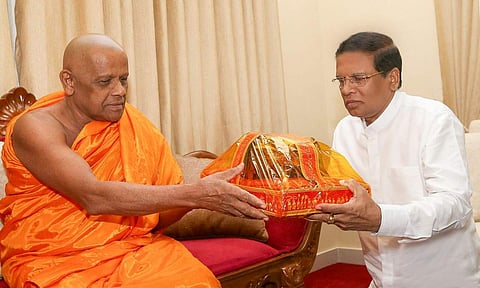

COLOMBO: The much-hyped Sri Lankan constitution making process has hit a serious snag.
President Maithripala Sirisena has told the Buddhist high priests in Kandy that he would once again consult the masses on the nature of the constitution, setting aside the report of the Public Representations Committee done after an exhaustive island-wide survey.
The Sirisena-Wickremesinghe government’s promise that a draft new constitution will be ready by 2016 has not been met and chances of it being fulfilled in the foreseeable future appear to be dim.
On Sunday, President Sirisena met the Chief Prelates (Mahanayake Theras) of the Malwatte and Asgiriya chapters of the Buddhist Sangha (Ven. Tibbotuwawe Sri Siddhartha Sumangala Mahanayake Thera and Ven.Warakagoda Gnanaratna Thera respectively) and told them that he does not intend to include any divisive elements in the new constitution.
By this he meant that the constitution will be a unitary and not a federal one; that the Northern and Eastern Provinces will not be combined to form a united Tamil-speaking province and that Buddhism will not be denied the “foremost place” in the country. The President said that the constitution will not be drafted without the blessings of the Mahanayake Theras.
Going further he assured the high priests that he would consult the masses again.
This could well mean that the report of the Public Recommendations Committee, drafted after holding painstaking consultations in all parts of the county will be jettisoned in favor of a fresh exercise.
Though the committee did not say whether the Sri Lankan constitution should be unitary or federal, it had made some radical suggestions. It wanted to turn the now powerful Provincial Governors into rubber stamps of the Chief Ministers and had sought powers over land and police for the provinces.
These recommendations had set off alarm bells among the majority Sinhalese who considers the recommendations to be secessionist.
The main opposition group, the Joint Opposition and the Sri Lanka Podujana Peramuna (SLPP), both indirectly led by former strongman Mahinda Rajapaksa, are opposed to the drafting of a new constitution. In fact they had successfully campaigned against the intention to draw up an entirely new constitution when parliament began the process of drawing up a constitution.
“What the country needs is not an entirely new constitution but the setting up of a Second Chamber in parliament and electoral reform,” Rajapaksa told foreign correspondents here recently.